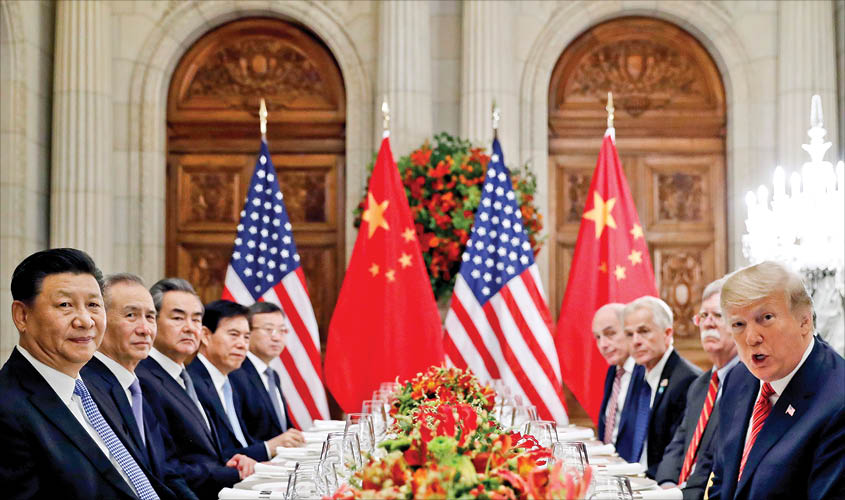US is trying to stop the export of cutting edge technology to Chinese companies.
As US President Donald Trump and Chinese President Xi Jinping sat down to have dinner at a Buenos Aires hotel on 1 December on the sidelines of the G20 Summit, Huawei’s chief financial officer (CFO), Meng Wanzhou, the daughter of Huawei founder, Ren Zhengfei, was being detained at Vancouver airport for selling American origin products to Iran through Skycom, a “hidden” subsidiary of Huawei, thus violating US sanctions. Though she has been granted bail and will be subjected to physical and electronic surveillance, there is no doubt that Meng is now a “hostage” of the economic cold war going on between the United States and China.
The case is similar to the US probing ZTE, another Chinese telecom giant, for trading US products with Iran. ZTE paid almost $2 billion to settle the deal. As the US puts pressure on its allies to proscribe Chinese companies amidst the escalating trade war, Chinese telecom giants like Huawei, ZTE and more recently Fujian Jinhua Integrated Circuit Co Ltd are facing the heat in the Western world. For example, the BT of the United Kingdom has announced that it will not use Huawei equipment for its 5G network; Huawei equipment from the existing 3G and 4G networks will also be removed. Many other countries including New Zealand and Australia are following suit.
In the wake of the US-China trade war, multilateral forums are increasingly becoming platforms for US-China duel, as was witnessed during the recently concluded APEC Summit in Papua New Guinea, where the leaders failed to reach a consensus on the final communiqué. Tensions soared as US Vice President Mike Pence criticised China for its policies and practices related to technology transfer, intellectual property and innovation, and said that the US “will not change course until China changes its ways”. President Xi Jinping, in turn, refuted these in his keynote address; China, rather, accused the US of protectionism, unilateralism, disruption and creating uncertainties.
It was speculated that the recently concluded G20 would also be used to score points by the US and China, for on 26 November, in an interview to the Wall Street Journal, the US President had threatened that if the trade deal was not reached, the US would go ahead with punitive tariffs on $200 billion of Chinese imports. Notwithstanding the rhetoric, a temporary 90-day truce was agreed upon. The US made it clear that if at the end of this period of time, the parties were unable to reach an agreement, the 10% tariff would be raised to 25%. It was reported that China had agreed to import a substantial amount of agricultural, energy, industrial and other products from the US to reduce the trade imbalance between the two. However, both sides were under pressure to strike a deal, as US stocks and the Chinese currency fell by around 10% each.
Notwithstanding the truce, will it stop the economic and political cold war between the two? I believe, tariff is not the only elephant in the room. Undoubtedly, as admitted by the US, China has emerged as a “strategic competitor” and the single largest disruptor of the international order established by the US. “Made in China 2025”—by way of which China would like to achieve 40% “self-sufficiency” by 2020, and 70% “self-sufficiency” by 2025 in core components and critical materials in a wide range of industries, including aerospace equipment, telecommunications etc.,—has rattled the US to its core. China has already made huge headways in areas such as artificial intelligence, robotics and quantum computing. The US is doing every bit to stop the export of cutting edge technology to Chinese companies. Early this April, it banned American companies from doing business with the Chinese telecom giant ZTE, albeit a bailout deal was reached. More recently, on 29 October 2018, the US Commerce Department announced that American companies would require a special licence to export all commodities, software and technology to the Fujian Jinhua Integrated Circuit. The order was passed in the aftermath of US chip giant Micron accusing the Fujian based company of intellectual property thefts. This is how protectionist measures by the US have been linked to national security. The US believes that any competition from China would be unfair, for the latter takes advantage of the openness and democratic systems of foreign countries, subsidises its own enterprises and raises barriers to external, political, cultural and economic influences at home. Both sides have portrayed the deal reached in Buenos Aires very differently. If the US talked tough and mentioned the 90-day truce as a second chance for China, conversely the Chinese official media did not make a mention of the truce period. It rather talked about a trade agreement and cooperation between the two and that both sides will gradually work towards decreasing the trade imbalance. It is clear that both countries are prepared for the long haul as the economic cold war gets murkier with the passage of time.
B.R. Deepak is Professor of Chinese Studies at Jawaharlal Nehru University, New Delhi.

